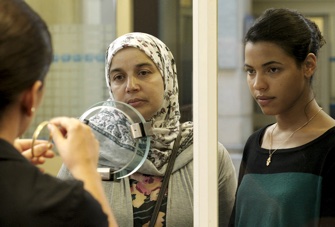
Fatima, directed by Philippe Faucon, is a film that speaks softly as it opens a door on a world rarely seen on the screen: that of two generations of a family of Algerian immigrants in France.
Fatima (Soria Zeroual) lives with her two teenage daughters in a tiny apartment and supports them by working as a cleaning lady. She speaks to them in Arabic, but they reply in French.
The older daughter, Nesrine (Soria Zeroual), is the good girl, the one who works hard at school and wants to be a doctor. Fatima takes on extra cleaning hours and sells some of her gold jewelry to help her daughter rent an apartment and pay her expenses. Meanwhile the younger daughter, 15-year-old Souad, is a typical rebellious teenager who slacks off at school, flirts with boys and cruelly mocks her mother for her poor spoken and written French.
This film’s suspense lies in the question of whether Nesrine’s hard work will pay off and allow her to pass the exams to get into medical school. We see the toll it takes on her nerves and those of her mother as she studies intensively and puts up with the scorn of neighboring women who accuse her of having abandoned her mother.
There is no violence in this movie, just the kind of small humiliations and small triumphs we all experience every day, except that the former are exacerbated by the everyday racism this small family encounters. When Fatima accompanies her daughter and two other girls to see an apartment for rent, the landlady claims she can’t show it to them because she doesn’t have the key and tells them that it probably won’t work out anyway. They politely accept what she says and leave. “She looked at me funny,” says Fatima. “It must be the headscarf.” One of the girls comments matter-of-factly that since two of the three aspiring roommates are North African, it might be better if they split up when looking at other apartments. There’s no anger, just a resigned acceptance of the way things are.
Not surprisingly, plenty of further humiliations come Fatima’s way in her work, but we learn that she has a secret life that provides something of an escape from her exhausting days and worries about her daughters. When she is alone at night in bed, she writes about her life in a diary.
As the film nears its end, her doctor sends her to an Arabic-speaking woman therapist because she has a lasting pain in her shoulder that has no cause that can be seen on X-rays. “Doctors don’t understand this kind of pain,” the therapist tells her.
By the end of the movie, Fatima’s writing has become a kind of autobiographical poetry that she finally begins to share with others, letting her girls know that there is more to their mother than might meet their eyes, just as there is more to this film than its simple, straightforward style would seem to indicate.
Favorite
